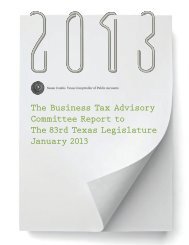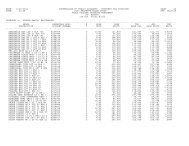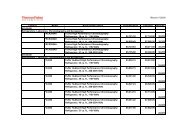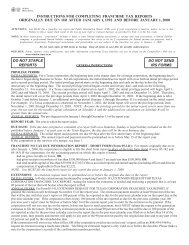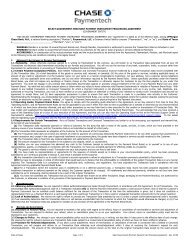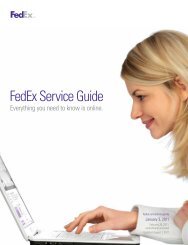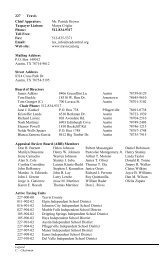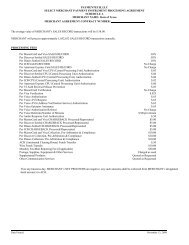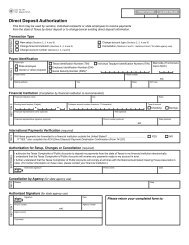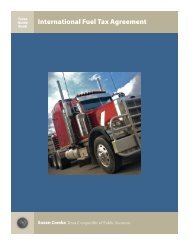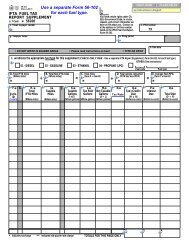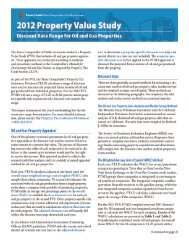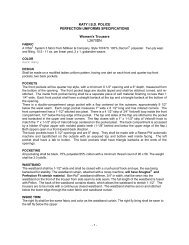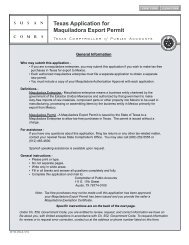Motor Vehicle Tax Guidebook 2011 - Texas Comptroller of Public ...
Motor Vehicle Tax Guidebook 2011 - Texas Comptroller of Public ...
Motor Vehicle Tax Guidebook 2011 - Texas Comptroller of Public ...
You also want an ePaper? Increase the reach of your titles
YUMPU automatically turns print PDFs into web optimized ePapers that Google loves.
Trade-In Allowance<br />
If a purchaser trades in a motor vehicle to the seller as<br />
part <strong>of</strong> the purchase transaction, the purchaser pays<br />
the tax on the trade difference. The allowance for the<br />
motor vehicle traded in is the value <strong>of</strong> the vehicle and<br />
not necessarily the equity in that vehicle. The trade-in<br />
allowance also applies to a purchaser’s traded-in vehicle<br />
when purchasing a motor vehicle consigned to a dealer.<br />
Calculating Sales <strong>Tax</strong> on Purchases from<br />
Licensed Dealer<br />
For retail sales <strong>of</strong> new and used motor vehicles<br />
involving licensed motor vehicle dealers, the motor<br />
vehicle sales tax is based on the sales price, less any<br />
amount given for trade-in vehicle(s) and/or dealer<br />
discount. For example, if a purchaser traded in a vehicle<br />
worth $6,000 for a $15,000 motor vehicle to a licensed<br />
dealer, tax due is as follows:<br />
Example:<br />
Total Sales Price $ 15,000<br />
Less Trade-In – 6,000<br />
<strong>Tax</strong>able Value $ 9,000<br />
<strong>Tax</strong> Rate x .0625<br />
Sales <strong>Tax</strong> Due $ 562.50<br />
The selling dealer’s signature on the title application<br />
is an acceptable record <strong>of</strong> the sales price. The county<br />
TAC, however, can request to see the dealer’s invoice or<br />
sales receipt from the purchaser.<br />
For private-party purchases <strong>of</strong> used motor vehicles in<br />
<strong>Texas</strong> or out-<strong>of</strong>-state purchases <strong>of</strong> motor vehicles for<br />
<strong>Texas</strong> use, the motor vehicle tax requires a comparison<br />
<strong>of</strong> the amount paid for the vehicle to a percentage <strong>of</strong><br />
the vehicle’s Standard Presumptive Value (SPV).<br />
Limited Sales <strong>Tax</strong> – Direct Pay;<br />
Occasional Sales<br />
Limited sales and use tax law, <strong>Tax</strong> Code Section<br />
151.417, provides for a direct pay permit that allows<br />
certain purchasers to remit sales tax directly to the<br />
<strong>Comptroller</strong>. Except for rentals and seller-financed<br />
sales, there is no similar provision for motor vehicle<br />
sales tax.<br />
Similarly, <strong>Tax</strong> Code Section 151.304 provides for the<br />
sale <strong>of</strong> the entire operating assets <strong>of</strong> a business to be<br />
exempt from limited sales and use tax as an occasional<br />
sale. <strong>Motor</strong> vehicle tax law does not provide for an<br />
occasional sale exemption. The purchaser owes motor<br />
vehicle sales tax on the transfer <strong>of</strong> the vehicles.<br />
<strong>Motor</strong> <strong>Vehicle</strong> <strong>Tax</strong> on Private-<br />
Party Purchases<br />
• Private-Party Purchases and Standard<br />
Presumptive Values<br />
• Excluded Private-Party Purchases<br />
• Calculating Sales <strong>Tax</strong> Due<br />
• Trade-In Allowance<br />
• SPV and Form 130-U<br />
• SPV Examples<br />
• Purchase Price Not Available<br />
- When the Seller Is Known to be a Dealer<br />
- In a Private-Party Sale or When the Seller’s<br />
Identity is Not Documented<br />
Private-Party Purchases and Standard<br />
Presumptive Values<br />
The motor vehicle tax due on a private-party purchase<br />
<strong>of</strong> a used motor vehicle, whether purchased in <strong>Texas</strong><br />
or out <strong>of</strong> state for <strong>Texas</strong> use, depends on a standard<br />
presumptive value (SPV) being applied. A sale between<br />
neighbors, relatives or strangers is a private-party<br />
transaction that triggers the SPV procedures.<br />
A private-party purchase does not involve a <strong>Texas</strong><br />
licensed motor vehicle dealer or a dealer licensed in<br />
another state. If a motor vehicle dealer licensed by <strong>Texas</strong><br />
or another state sells the used vehicle, motor vehicle tax<br />
is due based on the sales price.<br />
A licensed motor vehicle dealer is one that has a<br />
General Distinguishing Number (GDN), also known<br />
as a “P” number, from the TxDVM. The sale <strong>of</strong> a<br />
repaired or restored motor vehicle by a dealer that<br />
only holds a salvage vehicle dealers license, however,<br />
is a private–party transaction that triggers the SPV<br />
procedures.<br />
Excluded Private-Party Purchases<br />
The SPV law applies to the sale <strong>of</strong> all types <strong>of</strong> used<br />
motor vehicles except:<br />
• salvage or abandoned vehicles;<br />
• vehicles sold through storage or mechanic’s<br />
liens, or by a governmental entity (includes<br />
governmental sales conducted by an auction<br />
company);<br />
II-2<br />
<strong>Motor</strong> <strong>Vehicle</strong> <strong>Tax</strong> <strong>Guidebook</strong>



